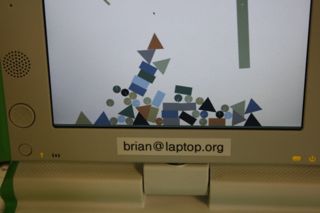Physics (activity)
This Wiki page is a work in progress -- and reflects the page used as a template, Speak.
Feel free to help form this page, it will be finished and moved to Physics once our project hosting application is approved and the source files are uploaded to the repository.
--Brian Jordan, OLPC summer intern
|
Physics
Physics is a physical world simulator -- you can add squares, circles, triangles, or draw your own shapes, and see them come to life with forces (think gravity, Newton!), friction (scrrrrape), and inertia (ahh, slow down!).
Photographs
Thanks to the Elements team and Alex Levenson for portions of this example code!
Instructions
How to install
Download this .xo file from the Browse activity: Speak-5.xo
Then follow the steps here: Activity_installation
If you have an older version, you'll need to delete it before you can download the new version. There are instructions here: Activity_Upgrade
You can also use xo-get to install and/or upgrade Speak (as well as many other activities).
How to play
Type something and press Enter to hear it spoken aloud. Use the toolbars at the top to change the voice's accent, rate and pitch or the shape of the eyes and mouth. After you've adjusted the settings it looks nicer in full-screen mode (Press Alt-Enter to switch).
Use the up/down arrow keys to scroll back through a history of things you have typed, or click the arrow button at the bottom right.
Use the Journal to resume your Speak activity including all voice, face and history settings.
How to develop
Speak is free software, licensed under the GPL. It is partially based on Arjun Sarwal's code from Measure and of course relies heavily on the wonderful speech synthesizer espeak. You can find the source code inside the .xo bundle or here: http://dev.laptop.org/git?p=activities/speak . If you have suggestions or contributions feel free to leave a comment on the discussion page Talk:Speak.
Release Notes
- v5
Speak now uses the default locale of the laptop to pick the default voice accent.
- v4
You can now use the arrow keys or history popup to get back to old things you typed. All history, voice and face settings are saved in the Journal so you can resume right where you left off. Fixed some small drawing glitches. The eyes now follow the text cursor when you type. The eyes now look at you when speaking. Pressing Enter no longer clears the text entry area.
- v3
Lots of performance improvements.
- v2
First public release.
Testing
Speak-5.xo has been tested on build 690 under emulation as well as on a G1G1 running 656.
Thanks to Troy Ihmels for beta testing for me.
Reviews
Read a review by Wayan Vota on OLPC News (with video demonstration by a child)
Here is an article from Chile's Un Computador por Niño web site Aplicaciones educativas en el OLPC: Sintetizador de voz (translated into English via Google)
An extremely fun activity. The developer did a great job of using the speech capabilities of the app to make it easy for the user to start playing. Great job incorporating the accents for different languages. This is one of the best speech apps I've seen in a while. - Paul Russell
Best Activity I've found for the XO so far! My niece will love it!!! Great Job! - Dwight Harvey
See also Talk:Speak
Bugs
There are intermittent performance problems, especially with long sentences. The toolbar sliders need icons or labels so you know what they do.
Feature requests
- Languages should be written as native, not in English: Français rather than French, Deutsch rather than German etc. And probably some generic sound rather than words in English to test the two cursors.
- I have added support for localization so that the language names can be translated. Volunteers welcome. jminor 12:42, 8 March 2008 (EST)
- (fixed in v5) Set default language to another language than English.
- Speak now uses the default locale of the laptop to pick the default accent. You can also save the settings you like in the Journal and resume that entry to start where you left off. jminor 12:39, 8 March 2008 (EST)
- (fixed in v4) Speak should save your settings to the journal.
- You should be able to draw/make new mouth and eye shapes.
- The mouth shape should be driven by espeak's phonemes rather than the audio waveform.
- The espeak API allows for per-phoneme callbacks which means that this should be possible. However my investigation leads me to believe that this would require significantly more time than I am able to invest in Speak. If you are interested in helping with this feature. Please contact me. jminor 02:29, 2 March 2008 (EST)
- You should be able to make it sing.
- (fixed in v4) Let the text scroll back so you can repeat something without retyping it.
- My favorite list: My child name, the numbers. greetings, etc,... Pato Acevedo.
- What happens when speak is shared with the neighborhood? Is there some way to integrate it so that users can make each other's laptops talk across distances? This would enable speak to be used as a simple chat for blind users. -Lesley
- I like this idea a lot! Cjb 01:14, 22 March 2008 (EDT)


